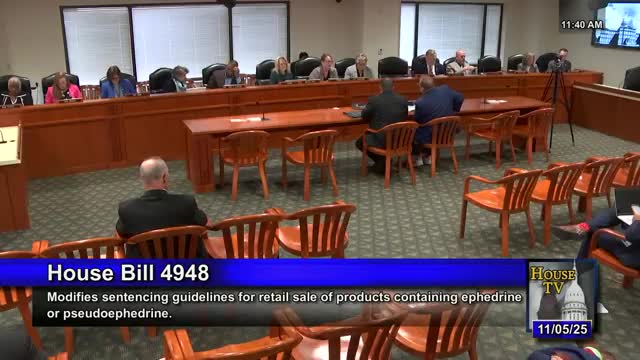Sponsors ask lawmakers to require manufacturers pay NPLEX fees and to allow online pseudoephedrine purchases
Get AI-powered insights, summaries, and transcripts
Subscribe
Summary
Representatives Bagole and McFall presented House Bills 4947 and 4948 to preserve Michigan's electronic pseudoephedrine tracking system (NPLEX), fix a funding loophole so manufacturers who sell in Michigan pay transaction fees, and permit modern purchase methods such as online or curbside pickup while retaining ID and quantity limits.
Representatives Bagole and McFall told the House Judiciary Committee that House Bills 4947 and 4948 would preserve and modernize Michigan's electronic pseudoephedrine transaction-tracking system (NPLEX). Sponsor testimony described the bills as a fix to a funding "free rider" problem — manufacturers whose products are sold in Michigan but who do not voluntarily contribute to the NPLEX transaction-cost pool — and as a way to enable online, curbside or home-delivery purchases while maintaining ID checks and statutory purchase limits.
Representative Bagole said the system is not paid for by taxpayers or consumers but has been voluntarily funded by manufacturers since Michigan adopted statewide electronic blocking in 2012. He argued the recent entry of out-of-state product manufacturers that do not pay into the system risks the long-term viability of NPLEX and that the bill simply requires manufacturers that sell in Michigan to pay the transaction fee for their product.
Representative McFall said the companion bill modifies a sentencing-code reference so that unlawful shipment or failure to comply with applicable federal law remains a class F felony but the description aligns with the funding fix in HB 4947; McFall emphasized HB 4948 is contingent on enactment of HB 4947. Carlos Gutierrez, vice president of state government affairs for the Consumer Healthcare Products Association, testified remotely in strong support, saying the industry supports the funding change and the modernization to allow online transactions provided ID checks and purchase limits remain enforced.
Sponsors and industry witnesses said NPLEX has been effective and cited system statistics (for example, blocking tens of thousands of box transactions), and they compared Michigan's posture to recent actions in other states. The committee did not take a final vote on these bills during the session.
